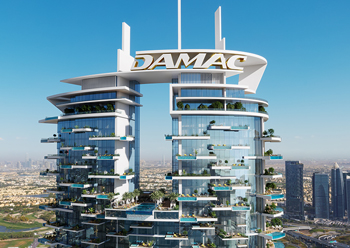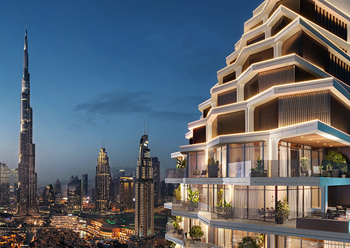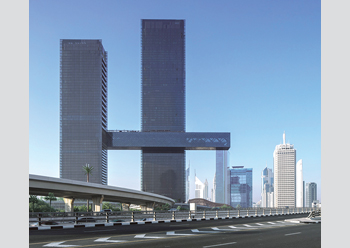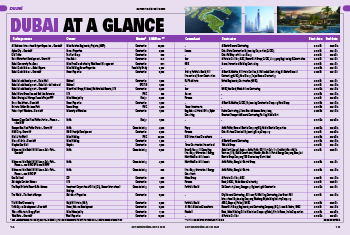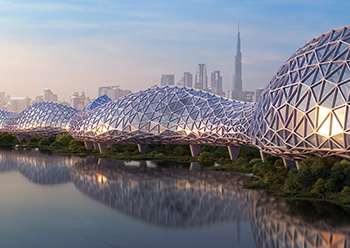
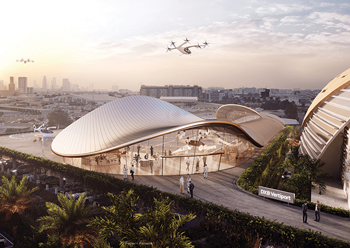 The roof of the vertiport will serve as the terminal for aerial taxis.
The roof of the vertiport will serve as the terminal for aerial taxis.
Dubai’s ambitions to launch air mobility solutions to cover the city took a step forward last month with HH Sheikh Mohammed bin Rashid Al Maktoum, the Vice President, Prime Minister of the UAE and Ruler of Dubai, having given his approval for the design of a station for the aerial taxis.
According to Skyports Infrastructure, a leading provider of infrastructure for the advanced air mobility industry, its vertiport design was approved for development by Dubai’s Ruler at the World Government Summit 2023.
The vision for Dubai’s future air mobility infrastructure network was jointly presented by Dubai’s Roads and Transport Authority (RTA), Skyports Infrastructure and Joby Aviation. The prototype design of the first aerial taxi vertiport is expected to seamlessly integrated with the other modes of mass transportation.
Unveiling the design at the summit, Sheikh Mohammed said the new project aims to roll out a mobility service driven by pioneering technology to ease travel across urban areas in a safe, smooth and sustainable manner.
 |
|
Sheikh Mohammed and Al Tayer discuss the aerial taxi model. |
To be located near the Dubai airport, the vertiport comprises a structure that features two levels for car parking. The topmost roof serves as the terminal for aerial taxis, which will be connected to the Emirates Metro Station via an air-conditioned bridge. It boasts a contemporary design that complements the general appearance and charm of Dubai.
According to the RTA, the air-conditioned aerial taxis will be crafted to meet top international safety standards and will be possess the unique capability of vertical takeoff and landing. The sustainable, eco-friendly vehicles will be powered by electricity, emitting zero harmful pollutants to the environment.
The taxis will also be recognised for their safety, comfort, and speed, featuring the latest technological advancements in the field. With a range of 241.4 km and a top speed of 300 km per hour, the aerial taxi will have a capacity to accommodate up to four passengers plus a driver.
“The initial network of vertiports will connect four main areas of Dubai: Downtown Dubai (Burj Khalifa area), Dubai Marina, Dubai International Airport and Palm Jumeirah,” explained Mattar Al Tayer, Director-General and Chairman of RTA board.
“The vertiports embody a revolutionary form of infrastructure that encompasses a range of facilities such as designated take-off and landing zones, a passenger waiting area, security protocols, and electric charging stations. These stations seamlessly integrate with other modes of transportation. The next step involves identifying exceptional investors who are experts in building the necessary infrastructure for the air mobility industry,” he added.
Al Tayer said the aerial taxi operation will be in two main stages; selecting the suitable technologies that meet global standards and forming a partnership with a specialist provider.
“The operation comprises four crucial elements. They include detailed negotiation with a multitude of companies active in this field, signing of commercial agreements, establishment of local entities to execute relevant business endeavours, development of the necessary infrastructure and the highly anticipated roll-out of the service,” he noted.
The second stage involves identifying a potential partner for investing in the infrastructure needed to introduce autonomous aerial taxis to Dubai's skies, he added.
The concept for the future vertiport infrastructure also demonstrates how it will integrate with existing transportation, including the RTA’s Dubai Metro network and Dubai International Airport.
Duncan Walker, CEO of Skyports, said: “We are honoured to have received such strong endorsement of our Dubai vertiport vision from HH Sheikh Mohammed. The appetite for technology innovation and infrastructure expansion in Dubai makes it a hugely promising environment for the launch of advanced air mobility. We’re excited to continue working with the RTA to make our joint vision of an integrated vertiport network a reality in 2026.”
Ahmed Bahrozyan, Chief Executive Officer of The Public Transport Agency at RTA, said: “The RTA’s plan for aerial taxis is in line with the Dubai Self-Driving Transport Strategy, which aims to make 25 per cent of all trips in Dubai driverless by 2030. The project aims to roll out a new mobility service driven by pioneering technology to ease the mobility of individuals across urban areas in a safe, smooth, and sustainable manner. The service is set to be operational by 2026.








.jpg)




.jpg)




























.jpg)


































